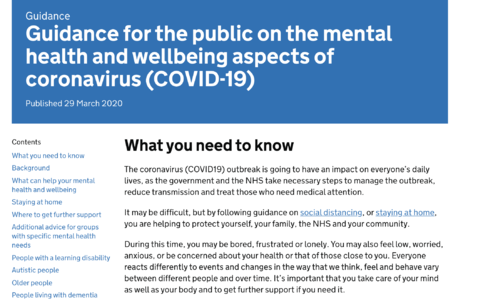Background

This guide provides advice on how to look after your mental health and wellbeing during the coronavirus (COVID-19) outbreak.
For wider guidance on how to protect yourself and others, and actions to take if you think you may have contracted the virus please see the guidance on this page.
This guidance will be updated in line with the changing situation.
What can help your mental health and wellbeing
Consider how to connect with others: Maintaining relationships with people you trust is important for your mental wellbeing. Think about how you can stay in touch with friends and family via telephone, video calls or social media instead of meeting in person – whether it’s people you normally see often or connecting with old friends.
Help and support others: Think about how you could help those around you – it could make a big difference to them and can make you feel better too. Could you message a friend or family member nearby? Are there community groups that you could join to support others locally? Remember it’s important to do this in line with guidance on coronavirus (COVID-19) to keep yourself and everyone safe. And try to be accepting of other people’s concerns, worries or behaviours.
Talk about your worries: It is quite common to feel worried, scared or helpless about the current situation. Remember that this is a difficult time for everyone and sharing how you are feeling and the things you are doing to cope with family and friends can help them too. If you don’t feel able to do that, there are people you can speak to via NHS recommended helplines or you could find support groups online to connect with.
Look after your physical wellbeing: Your physical health has a big impact on how you are feeling emotionally and mentally. At times like these, it can be easy to fall into unhealthy patterns of behaviour which in turn can make you feel worse. Try to eat healthy, well-balanced meals, drink enough water, exercise inside where possible and outside once a day, and try to avoid smoking, alcohol and drugs.
If you are able to go outside, consider walking or gardening (keeping the recommended 2 metres from others as outlined in the social distancing guidance). If you are staying at home, you can find free easy 10 minute work outs from Public Health England or other exercise videos to try at home on the NHS Fitness Studio. Sport England also has good tips for keeping active at home.
Look after your sleep: Feeling anxious or worried can make it harder to get a good night’s sleep. Good-quality sleep makes a big difference to how you feel mentally and physically, so it’s important to get enough.
Try to maintain regular sleeping patterns and keep good sleep hygiene practices – like avoiding screens before bed, cutting back on caffeine and creating a restful environment. The Every Mind Matters sleep page provides practical advice on how to improve your sleep.
Try to manage difficult feelings: Many people find the news about coronavirus (COVID-19) concerning. However, some people may experience such intense anxiety that it becomes a problem. Try to focus on the things you can control, including where you get information from and actions to make yourself feel better prepared.
It is okay to acknowledge some things that are outside of your control right now but constant repetitive thoughts about the situation which lead you to feel anxious or overwhelmed are not helpful. The Every Mind Matters page on anxiety and NHS mental wellbeing audio guides provide further information on how to manage anxiety.
Manage your media and information intake: 24-hour news and constant social media updates can make you more worried. If it is affecting you, try to limit the time you spend watching, reading, or listening to media coverage of the outbreak. It may help to only check the news at set times or limiting to a couple of checks a day.
Get the facts: Gather high-quality information that will help you to accurately determine your own or other people’s risk of contracting coronavirus (COVID-19) so that you can take reasonable precautions. Find a credible source you can trust such as GOV.UK, or the NHS website, and fact check information that you get from newsfeeds, social media or from other people.

